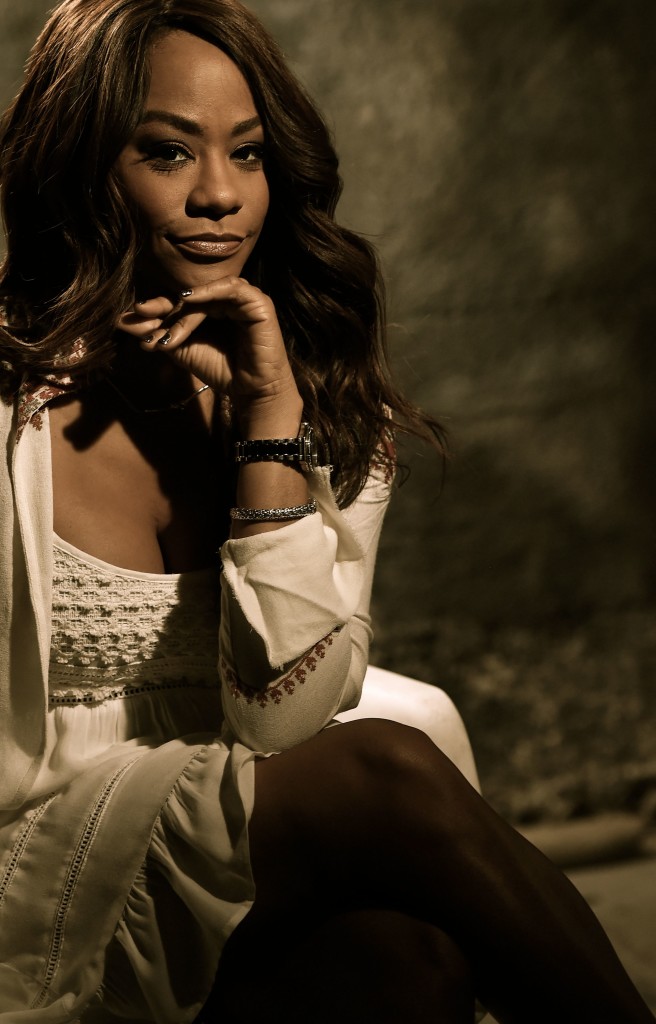
By Annie Dinerman
[T]asha Taylor’s new R&B/soul songwriter CD, Honey For The Biscuit, was recently reviewed by Elmore staffer and R&B songwriter Annie Dinerman. Annie was so taken with Tasha’s sound that she reached out to dialogue with Taylor about songwriting, producing and the “Heart Of Soul.”
Annie Dinerman: As producer, you came up with a very enjoyable musical style for the band tracks. Were there arrangements or did the musicians create their parts?
Tasha Taylor: Thanks! I’m glad you are enjoying it and I appreciate that the most. As a producer, I wanted to approach the record from my own Blues perspective. I wanted to take the songs that I had written on my guitar and put them together on the same record, and that was the vision this time. I did a demo of the songs just with vocal and guitar first, then had a bandmate, [sax player] Wes Smith, create charts from the demos. When I got to the studio, I decided to sing each song for the band before the first take for arrangements, vibe and tempo. Usually at that point, Nathan Watts, my associate producer and bass player, would come up with a great idea to compliment what was already there. We would build as a band from there, everyone jumping in to help that groove for that song.
AD: The way you’ve produced Honey For The Biscuit, your voice and lyrics are out in front.
TT: True. For me the story is first. So, I am always building around what tells the story the best, as well as attempting to capture my voice in its best moments of the take. … Being able to understand the lyrics, for me helps the story, so I tend to keep them pretty upfront, yes.
AD: You don’t shy away from confessional lyrics. You don’t mind letting us know that you’ve dated some men who did not turn out to be relationship material, for instance. I’m not asking about your love life. I’m asking about you as a songwriter.
TT: Welllll… They are kind of one and the same. If I’m writing from an “I” place, not a place of observation. That’s my style… these are my experiences and therefore, I can really come from an emotional place, vocally. This record, I did, however, collaborate on three songs: “Leave That Dog alone”, “Weatherman” and “How Long.” I went to Nashville and did the traditional writing sessions with Tom Hambridge who’s been writing and producing for [blues guitarist and singer] Buddy Guy for years. We got in a room and listened to ideas that we both brought in and decided which ones to finish, based on what fit my story and style. It was a different approach for me, I usually just wait for the songs to come to me and I work from there. It was great to step outside of my comfort zone, and I love those tunes.
AD: This deeply personal songwriting, is it also a product of your love for the blues?
TT: Maybe. Blues is a genre of music that starts with the values of raw emotion and story. Not technical perfection or slick production. That is my love affair with blues and soul music. We are a good fit, because I appreciate these values in this music most. I can only hope to keep evolving on all levels. Singer, writer, musician and producer as well as human being. As my life evolves, my work has to evolve as well.
AD: Pink and Katy Perry, for instance, write confessional lyrics. But they’re surrounded by so much production that the lyrics take second place to the music.
TT: I am a fan of both of these women, and I think they have done a great job of making a place for women to be able to express themselves and be unique. Pop music works in the opposite of blues and soul; the production is the framework that the music succeeds in… the message is there, but the delivery is much different and can often get misunderstood as disempowering as opposed to empowering.
AD: I understand that Concord Group is moving ahead with Heart Of Soul, their planned Broadway musical about Stax Records which was home to Carla Thomas, Otis Redding and Isaac Hayes.
TT: Yes!!! I am so excited about this project. This musical is all about the history and magic of Stax and its music.
AD: And, of course, your father, Johnnie Taylor, had some historic hits on Stax. He was billed as “The Philosopher of Soul.” What’s it like to see him portrayed by an actor?
TT: The cool thing that worked out is casting my brother, Jon Taylor, to play our dad. He is a trained actor as well as a musician. He’s a perfect fit! I am a co- producer along with Booker T. Jones [of Booker T. and the MGs] and I am playing the role of Mimi James. She is a tour guide at the Stax museum in Memphis and second generation Stax as her father was a trumpet player in the Stax house band. I am the lead character that takes the audience on the ride, or tour of the story… The play will go up regionally at The Globe Theater in Baltimore, then on to Broadway.
AD: You’ve already got acting experience in films and TV. When you first started acting, was it a desire on your part, or did an opportunity appear?
TT: I started doing musical theater pretty young, and that … is where I learned that I loved both. I went to Boston University and I was a Shakespearean Theatre major, and I’ve studied privately for years. Always keeping my acting tools sharp.
AD: You’ve acted in TV and film roles, and you’ve sung onstage. So Heart Of Soul would seem to bring together your skills from past work.
TT: This is a large role, so the challenge is always learning lots of lines and music.
AD: Have you ever done eight shows a week?
TT: I have not. Looking forward to the challenge.
AD: When you first learned to play guitar, did you start with blues? What music were you listening to?
TT: I grew up listening to Prince, Madonna, Michael Jackson, New Order, Diana Ross, Violent Femmes. All kinds of music. But I listened to my dad’s music the most. When I started playing guitar, I just started writing and didn’t label what I was writing at all in the beginning.
AD: You toured with your father, and he’s got to be among your musical influences.
TT: There is no other bigger influence for the stage than him for me.
AD: When you sing, you deliver your lyrics with real authority. Were you taught to do that or is it just your nature? Or maybe it’s partly due to the music you listened to in your teens?
TT: My dad always said, “Tell the story.” So, I just sing from my heart and tell the story.







Be the first to comment!